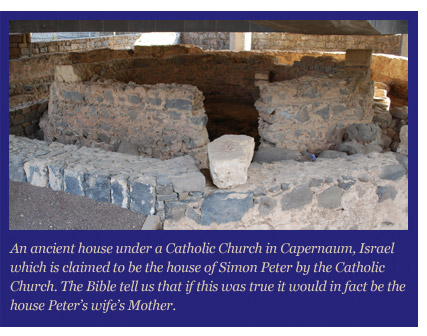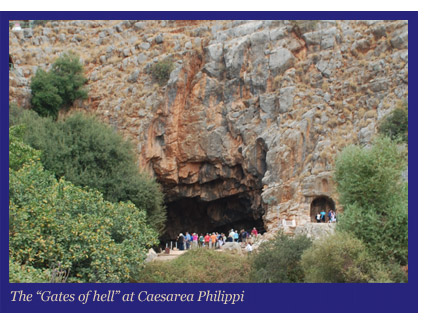
|
Was Peter the first Pope?
The Bible Teaching Concerning Peter
|
|
Friday, February 22, 2013
|
www.bibleinthenews.com Audio & Print versions
|
With the recent resignation of Pope Benedict still a hot news story, it is a good time to examine the Bibles teaching concerning Peter - this is Matt Davies joining you for another Bible in the News.
Since Joseph Ratzinger announced his retirement, opinions abound about what the truth might be behind his shock announcement. The general concensus in the media is that he is too old and frail to continue - but as his resignation flies in the face of a strong church tradition whereby a pontiff endures the infirmity of old age until the end without abandoning the call to serve as "the Holy Father", other conspiracy theories have been floated. For example The Guardian on Thursday 21st of February reported that:"A potentially explosive report has linked the resignation of Pope Benedict XVI to the discovery of a network of gay prelates in the Vatican, some of whom – the report said – were being blackmailed by outsiders. The pope's spokesman declined to confirm or deny the report, which was carried by the Italian daily newspaper La Repubblica."
However with all the hype around the Popes resignation and the appointment of a new pope it is a good thing for those seeking the truth of the Bible to consider the institution of the Papacy and the authority of the Pope.
A question that needs an answer.
At the outset it might be worth saying that the intention of this weeks Bible in the News is not to mock and criticise others personally. Our intention is simple: to answer one key question simply using the Bible – not our own human understanding or wisdom.
The question we hope to answer very clearly is: Was Peter the first bishop of Rome?
Why is this question relevant? Well it is claimed by the Catholic church that Peter was the first of many Popes who are God’s representatives on earth and who which need to be obeyed.
“The title pope, once used with far greater latitude, is at present employed solely to denote the Bishop of Rome, who, in virtue of his position as successor of St. Peter, is the chief pastor of the whole Church, the Vicar of Christ upon earth.” The Catholic Encyclopaedia
The Bible our basis.
The words of the Bible of course are the only measure by which we can judge the answer to such a question. As The Lord Jesus Christ said:
He that rejecteth me, and receiveth not my words, hath one that judgeth him: the word that I have spoken, the same shall judge him in the last day. John 12:48
Also consider these words from the inspired apostle Paul:
All scripture [is] given by inspiration of God, and [is] profitable for doctrine, for reproof, for correction, for instruction in righteousness: 2 Timothy 3:17
Therefore taking the principles that these verses lay down then as our basis let us consider the question of Peter being a Pope by using the words of the Bible. Knowing the answer to this could really effect the way we choose to follow God and whether or not we decide to be a Catholic and accept the personage of the Pope as our spiritual leader.
Six Reasons why Peter was not the first Pope
As Christadelphians we do not accept that Peter was a “Pope”. Peter was a faithful man – but not anything like the figure of the Pope which we know today or whose position is currently begin discussed as being filled after the resignation of the recent Pope, Pope Benedict XVI.
 1. Peter was married
1. Peter was marriedAccording to the Catholic church the clergy should be celibate:
“Clerics are obliged to observe perfect and perpetual continence for the sake of the kingdom of heaven and therefore are bound to celibacy which is a special gift of God by which sacred ministers can adhere more easily to Christ with an undivided heart and are able to dedicate themselves more freely to the service of God and humanity.” Catechism of the Cahtolic Church No. 277
However the Bible tells us Peter was married:
“And when Jesus was come into Peter’s house, he saw his wife’s mother laid, and sick of a fever.” Matt 8:14
This would mean that if Peter was alive today he would not be considered as holding the office of Pope as he was married.
Another verse comes to mind in passing to do with this teaching of the Catholic Church about marriage being forbidden by it's clergy:
"Now the Spirit speaketh expressly, that in the latter times some shall depart from the faith, giving heed to seducing spirits, and doctrines of devils; Speaking lies in hypocrisy; having their conscience seared with a hot iron; Forbidding to marry, and commanding to abstain from meats, which God hath created to be received with thanksgiving of them which believe and know the truth." 1 Timothy 4:1-3
2. Peter made grave mistakes on matters of faith and morals.
According to the Catholic Church when a Pope speaks on matters of Faith or Morals he is speaking infallibly
“The Roman Pontiff, head of the college of bishops, enjoys this infallibility in virtue of his office, when, as supreme pastor and teacher of all the faithful—who confirms his brethren in the faith—he proclaims by a definitive act a doctrine pertaining to faith or morals” Catechism of the Catholic Church No. 891
However on speaking on matters of Faith and morals Peter, at times, got things horribly wrong:
“Then Peter took him, and began to rebuke him, saying, Be it far from thee, Lord: this shall not be unto thee. But Jesus turned, and said unto Peter, Get thee behind me, Satan (adversary): thou art an offence unto me: for thou savourest not the things that be of God, but those that be of men.” Matt 16:22-23
So Peter got something wrong in relation to faith. Consider the following though:
“But when Peter was come to Antioch, I (the apostle Paul) withstood him to the face, because he was to be blamed. For before that certain came from James, he did eat with the Gentiles: but when they were come, he withdrew and separated himself, fearing them which were of the circumcision. And the other Jews dissembled likewise with him; insomuch that Barnabas also was carried away with their dissimulation. But when I saw that they walked not uprightly according to the truth of the gospel, I said unto Peter before them all, If thou, being a Jew, livest after the manner of Gentiles, and not as do the Jews, why compellest thou the Gentiles to live as do the Jews?” Galatians 2:11-14
So here, Peter, although a foremost disciple in the early community of believers in Christ, made a huge mistake - but Paul puts it right. This was an issue of faith and morals.
3. Peter refused to be worshipped.
“As Peter was coming in, Cornelius met him, and fell down at his feet, and worshipped him. But Peter took him up, saying, Stand up; I myself also am a man.” Acts 10:25-26
Here, Peter refused to be worshiped. The Pope does not! We are sure to see pictures of vast worshipping crowds as they bow to honour the newly elected Pope.
In Luke chapter 9 (v46) and in chapter 22 (v24) the disciples argue about who is the greatest. The Bible does not mention that Peter was the greatest which you think it would if Peter was indeed the first Pope.
4. Christ told the disciples not to be called by the title of Father
“But be not ye called Rabbi: for one is your Master, even Christ; and all ye are brethren. And call no man your father upon the earth: for one is your Father, which is in heaven.” Matthew 23:8-9
In verse 1 of Matthew 23 we read that this message given to Peter as he would have been one of the disciples present. We wonder what Peter would therefore make of the the official title “Pope” which comes from latin “Papa” which means father. The Pope is often called “The Holy Father”.
Later in his inspired writings Peter references the ideas of holding a high office as he speaks to elders within the community of the faithful. This is what is recorded:
“The elders which are among you I exhort, who am also an elder, and a witness of the sufferings of Christ, and also a partaker of the glory that shall be revealed: Feed the flock of God which is among you, taking the oversight thereof, not by constraint, but willingly; not for filthy lucre, but of a ready mind; Neither as being lords over God’s heritage, but being ensamples to the flock.” 1 Peter 5:1
5. Jesus is the only head of the eccleisa (church or congregation)
“Christ hath put all things under his feet, and gave him to be the head over all things to the church (ecclesia / community)” Ephesians 1:22
The Bible also records that Christ is the only mediator required between us and God:
"For there is one God, and one mediator between God and men, the man Christ Jesus;” 1 Timothy 2:5
Therefore it is not possible that Peter filled the roll of being head of the church?
6. The silence of the Bible
It might also be worth mentioning that the Bible is also silent on the following issues:
• “Successors” to Peter
• Peter being selected to be the Vicar of Christ on earth
• Peter being greater than any of the other disciples
• Peter acting like a Pope and exercising any authority
Now if Peter was the first Pope and the institution of the church is so important why, on these issues, are there no instructions in the scriptures to the servants of God about them? The answer must be that there is no instruction because true followers should not be following these ideas.
 The confession of Peter
The confession of PeterRoman Catholics will put forward the following verse in support of the idea of Peter being given some special authroity in the early church and so it is only fair that this verse is now considered:
“And Jesus answered and said unto him, Blessed art thou, Simon Bar–jona: for flesh and blood hath not revealed it unto thee, but my Father which is in heaven. And I say also unto thee, That thou art Peter, and upon this rock I will build my church; and the gates of hell shall not prevail against it. And I will give unto thee the keys of the kingdom of heaven: and whatsoever thou shalt bind on earth shall be bound in heaven: and whatsoever thou shalt loose on earth shall be loosed in heaven.” Matt 16:17-19
This, says the Catholic, is Christ giving Peter special authority as the head of the Church.
Context Context Context
The key to understanding this passage (like most passages of scripture) is to ensure that it’s context is fully understood. You’ll note in verse 17 that Jesus is answering something. What is he answering? Read form verse 13:
“When Jesus came into the coasts of Caesarea Philippi, he asked his disciples, saying,Whom do men say that I the Son of man am? And they said, Some say that thou art John the Baptist: some, Elias; and others, Jeremias, or one of the prophets. He saith unto them, But whom say ye that I am? And Simon Peter answered and said, Thou art the Christ, the Son of the living God.” Matt 16:13-16
So Peter had just made a great confession of faith – that Jesus was the Christ. The Messiah. The son of God. It is in reply to this that Jesus says “That thou art Peter, and upon this rock I will build my church”. What does he mean here though. Does it mean that he would build his church (or ecclesia / community) upon Peter or that he would build his church upon the CONFESSION of Peter that Jesus was indeed the Christ.
A play on words.
There is also a slight play on words in the reply of Christ.
Peter’s name in the Greek is Petros which means a detached stone, like a pebble or bolder. Jesus says in effect, “you Peter are a small stone”. Then Jesus goes on to say that his community would be built upon a “rock” but this word is different from Petros. The Greek is Petra which means a mass of rock like a cliff or mountain. So Jesus is saying that the confession of Peter is like a mountain. There is a distinction in the words of Christ which is therefore lost in the English and Christ is clearly not speaking about Peter being the Rock upon which he would build his community.
In fact if you look elsewhere in the Bible it is clear that this is the case. Christ himself was the foundation rock upon which his community was built and not Peter. Consider the following verse:
"For other foundation can no man lay than that is laid, which is Jesus Christ.” 1 Corinthians 3:11
The gates of Hell
What about the comments about Christ in regards to the “Gates of Hell”? It’s interesting to note that Christ and the disiples were at a place called “Caesarea Philippi” (v13). At this place was a Cave (now known as the grotto of Pan) which was known as the “gates of hell”. It was used as the centre of pagan worship in the days of Christ. Therefore reference to the gates of hell not prevailing against Peters confession means that the Pagan religion would not overcome Christianity.
Keys of the Kingdom
It is also true that Jesus tells Peter he will be given “keys”. What is this in reference to?
Well the Bible clearly speaks of Peter being given the ability to preach. For example in Acts 2 and Acts 10. He would have the ability to “open” up information regarding salvation to both Jews and Gentiles. This information and ability are the “keys” to understanding heavenly things and being held in favour with God. Keys in the Bible are a symbol of authority (Isaiah 22:22) but not the authority the current Pope has. In this context they are the authority of knowledge which unlocks understanding and opens up God’s wonderful plan and purpose. This is known as “the gospel” or “good news” which in the letter to the Romans is refereed to as “the power of God unto salvation ” (Romans 1:16). This authority of understanding and preaching was being neglected by the leaders of Israel at the time of Christ (Luke 11:52).
Therefore we conclude that this verse does not contain evidence of Christ giving Peter authority within the Church and that the church would be built on his authority – but that, in fact it is referring to the confession of Christ and the truth of the gosple message which the true community of believers would be built upon.
The Pope in the Bible
It might be interesting to note that a prophecy in the Bible does seem to correlate exactly with the institution of the Popes. Consider this prophecy:
"Let no man deceive you by any means: for that day (the coming of Christ) shall not come, except there come a falling away first, and that man of sin be revealed, the son of perdition; Who opposeth and exalteth himself above all that is called God, or that is worshipped; so that he as God sitteth in the temple of God, shewing himself that he is God.” 2 Thess 2:3-4
This “man of sin” describes an office or a succession of “men of sin” which was being conceived very early on in the history of Christianity. Later in the chapter we read that “the mystery of iniquity doth already work” (v7) and so we should be able to trace the apostasy back to the earliest of times.
Reading on we also find that this power exists down through time until the Lord Jesus Christ himself returns to the earth and destroys it:
“And then shall that Wicked be revealed, whom the Lord shall consume with the spirit of his mouth, and shall destroy with the brightness of his coming:” 2 Thess 2:8
It is that day that true followers of the Bible message long for when God’s kingdom will be re-established on the earth. The inspired words of the Apostle Paul to Timothy come to mind as an appropriate warning to close this weeks Bible in the News with:
”I charge thee therefore before God, and the Lord Jesus Christ, who shall judge the quick and the dead at his appearing and his kingdom; Preach the word; be instant in season, out of season; reprove, rebuke, exhort with all longsuffering and doctrine. For the time will come when they will not endure sound doctrine; but after their own lusts shall they heap to themselves teachers, having itching ears; And they shall turn away their ears from the truth, and shall be turned unto fables.” 2 Timothy 4:1-4
Join us again next week for another Bible in the News.
Printed: Friday, February 22, 2013
Visit www.bibleinthenews.com for a weekly analysis of world politics in the light
of Bible prophecy!